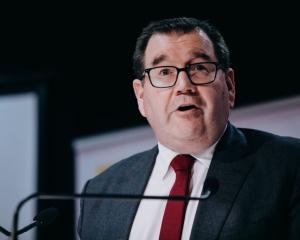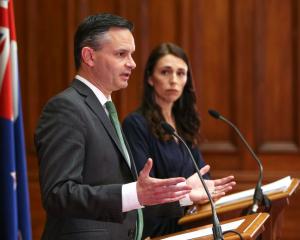
Infrastructure Minister Steven Joyce said yesterday the Government would ‘‘turbo-charge’’ its $32.5billion infrastructure investment by creating a new National Infrastructure Commission, leading to more PPPs.
That would ensure New Zealanders got faster access to new schools, hospitals and roading.Initial projects being considered included the $1.4billion redevelopment of Dunedin Hospital.

"PPPs are very effective at getting quality long-lasting infrastructure built more quickly and using private capital to stretch the country’s capital budget so we get more built."
The infrastructure commission would be responsible for expanding the number of PPPs. National would merge two units from the Treasury to form the core of the commission, with an additional $2.5million a year in funding to operate it, Mr Joyce said.
The Employers and Manufacturers Association (EMA), based in Auckland, said the creation of the commission was a significant step for delivering major infrastructure projects critical to the social and economic wellbeing of New Zealand.
The creation of such an agency had been a long-term goal for the EMA and was priority No 2 in its election policy manifesto, chief executive Kim Campbell said.
"We’ve seen internationally how successful such agencies can be in the delivery of PPPs and other major infrastructure projects. We see a New Zealand version as a real catalyst for speeding up the delivery of projects."
In Canada, all projects of more than $100million were run through a PPP screen and about 15% of all infrastructure projects were delivered through PPPs, he said.
Many of those projects would not have gone ahead unless they were PPPs and they had been successfully used to build hospitals, roads, bridges and energy projects.
PPPs had not been used to deliver more critical infrastructure because of a lack of a consistent pipeline to attract big international financiers and construction companies capable of delivering more of these projects.
The new commission could help solve the issue, Mr Campbell said.
Mr Joyce said the commission would work alongside the new investment company, Crown Infrastructure Partners, which would jointly invest with councils and private companies in non-government-owned infrastructure such as local roads, water networks and the UFB programme.
As well as the $32.5billion to be invested over the next four years, the Government planned further spending of about $40billion over the next four years.
Other projects to be considered were: the $50million rebuild of Whangarei Boys’ High School; a $1.7billion project to modernise and upgrade defence bases throughout the country; the $1.9billion project linking State Highways 20 and 1, in Auckland; construction of a new local road linking the middle of the Whangaparaoa Peninsula with State Highway 2; a new 1500 bed Waikeria Prison.
Comments
PPP's are an excellent medium to ensure ongoing massive profits for investment funds and bankers. People should look around the world. There are thousands of wonderful deals that deliver mediocre outcomes for the public, massive tolls for road, rail and airport users and fantastic profits for the money men (and women).












